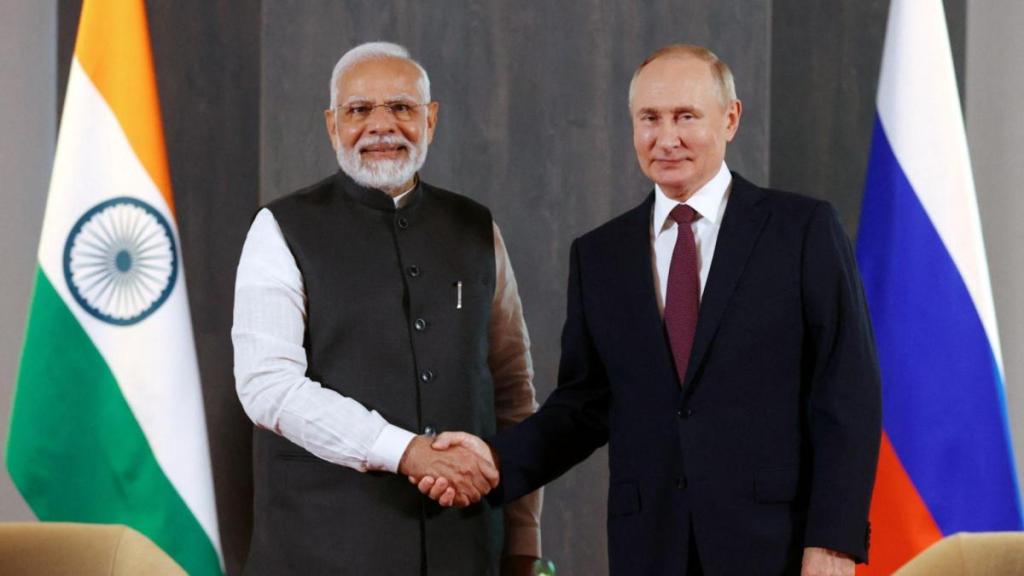By Anita Inder Singh
During his trip to Moscow from July 8-9, Prime Minister Narendra Modi hailed Russia as India’s “all-weather friend” and “trusted ally”. Wittingly or unwittingly, he used the language used by China to compliment Pakistan several times when India accused Islamabad of fomenting and exporting terrorism. And it is surprising that Modi referred to Russia as an ally, given that there are no binding military agreements between India and Russia, and Delhi always asserts its strategic autonomy. Add to that Russia’s threats of nuclear strikes on North Atlantic Treaty Organization (NATO) countries, and many in India and the West might wonder why Delhi is about to get closer to a warmongering Moscow.
While the puzzles created by the premier’s language are solved, two points in the bilateral Indo-Russian ties are clear. First, Moscow says that 30-50 Indians duped by Indian travel agents and seemingly by the Russian authorities into travelling to Russia and being forced to fight against Ukraine will be returned to India. Russia has politely used the term “misled”.
Second, talks are underway for Russia to help India to manufacture spare parts for the Russian weapons it has used for half a century. The delivery of those arms stalled because Russia remains mired in its brutal onslaught on Ukraine since February 2022.
At another level, India wants to sign a free trade agreement (FTA) with the Russia-led Eurasian Economic Union (EAEU), a group of some former Soviet republics. There, it will face stiff competition from China, partly because China already has strong trading ties with the EAEU. With its large economic capacity and Moscow’s consent, China is already the largest investor in Central Asia and the Russian Far East, where India, for geopolitical or economic reasons, wants to advance its interests.
Meanwhile, China happily sees Modi’s visit throwing a spanner in the Western works to isolate Russia through sanctions because of its war in Ukraine. Russia has been working hard to show that it has Asian friends. China’s President Xi Jinping met Vladimir Putin in Moscow in March 2023. In June, shortly before Modi visited Russia, nuclear-armed North Korea and non-aligned Vietnam invited him. To propagandise Putin’s circle of well-wishers, Modi’s visit was treated by Moscow as one from an old friend.
On the international front, there was no escaping the fallout from the Ukraine war, as Modi’s visit coincided with the start of the NATO summit on June 9. Washington expressed its concern and hoped that Modi would impress on Putin the necessity of respecting international law and the territorial integrity of states. This statement came at a time when Washington had expressed hope of strengthening cooperation with India. Moscow alleged that this concern was motivated by jealousy.
At another level, even as Modi made his way to Moscow, Russia bombed a children’s hospital in Kyiv, killing dozens of patients. Given Russia’s scorched-earth campaign in Ukraine for more than two years, the sympathy voiced by Modi for the dead children didn’t carry much weight.
As for persuading Putin to negotiate for peace in Ukraine, many countries have failed to do that and will fail again, since Putin sees himself as a 20th century Peter the Great. He has equated Russia’s invasion of Ukraine with Peter’s expansionist wars three centuries ago. Putin has thus acknowledged that his war in Ukraine is a huge land grab, intended to re-establish Russia’s 17th century empire.
India’s pragmatic strategic concern is Russia’s “no-limits” ties with China. But there is very little that New Delhi can do to drive a wedge between China and Russia. China is the bigger economy, has openly provided diplomatic cover to Russia during the Ukraine war, and has helped sustain the Russian economy and its military-industrial capacities through dual-use items that can be used for both civilian and military applications such as technology, satellites, or drones. Beijing has therefore acquired considerable leverage over Moscow, something that Delhi cannot emulate.
Moreover, as long as President Xi Jinping is in charge, India-China relations won’t improve. Xi’s politics within the Chinese Communist Party makes him adhere to an expansionist hard nationalistic line, which has parallels with Russia’s in Ukraine. So, Xi and Putin understand each other pretty well.
Delhi’s talk of an FTA with the EAEU and all-weather friendship with Russia should not overlook Russia’s regional and global interests in having a strong strategic partnership with a territorially revisionist as well as an economically and militarily powerful China. They are united by their hostility towards America’s global primacy. China’s economy, nearing $18 trillion, presents it with a better chance of becoming a global power than Russia or India, whose economies are valued at $2.02 trillion and $3.54 trillion respectively. India can do nothing to change Russia’s lower-ranking role in the Sino-Russian ties or their aversion to America’s pre-eminence.
Russia is neutral on the Sino-Indian conflict and is not “for India against China”. It has counselled India to join China’s Belt and Road Initiative, which India views as a unilateral push to advance China’s interests and a threat to India’s sovereignty because it cuts across disputed turf in Pakistani-occupied Kashmir.
The US, which is hoping to strengthen cooperation in sensitive high tech with India, will doubtless mull over the nature of Modi’s visit to Russia. Back home, many Indians will be pleased that Russia conferred its highest civilian honour on their PM. However, that is unlikely to bring peace to Ukraine, contain China, improve Indo-American relations or the global standing of either India or Russia.
(The author is founding professor, Centre for Peace and Conflict Resolution, New Delhi. Views expressed are personal opinions.)


